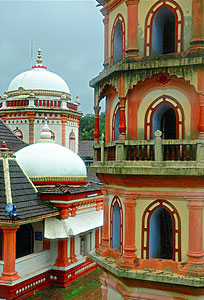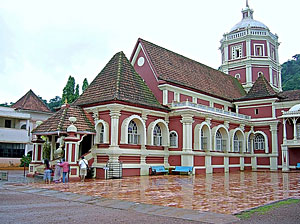|
|
Ponda, Goa
..............................................................................................
|
|
Information about Ponda
Ponda, known as Antruz Mahal because of the
concentration of culture, music, drama and poetry also
houses the temples. The busy inland town of Ponda, about
29 kms southeast of Panaji, and 17 kms north-east of
Margao is home to a number of unique Hindu temples and
several spice plantations. The city of Ponda is also the
capital of Ponda Taluka. Ponda was not officially part
of Portuguese Goa until it was ceded to them by the King
of Sunda in 1791 and annexed it along with Quepem,
Canacona and Sanguem forming the New Conquests, but it
was one of the first provinces conquered by them.
However, it was quickly retaken by the Adil Shah Dynasty
of Bijaipur who built the Safa Mosque. During the
Inquisition many Hindu devotees were forced to remove
images from Portuguese territory to safety. Many were
taken only as far as Ponda which was just over the
border. Ponda can be described as the Hindu heart of Goa.
It is famous for the five important |
 |
|
|
temples that
are situated around the town, and also has the largest mosque
in Goa. Most of these temples look relatively new as they have
been restored after being destroyed by the Portuguese. That
explains why there are no temples around the coast, which was
the prime territory of the Portuguese. The Hindu temples were
rebuilt form originals destroyed by the Portuguese and their
lamp towers are a distinctive Goan feature. It began as an
administrative center with the establishment of administrative
offices and court and soon became a commercial center. Most of
the area known as Ponda today was a part of "Quela" village.
Today it is an industrial city with many large factories and
industrial estates nearby. Ponda is also the gateway to Goa's
wildlife sanctuaries, both the Bondla and the Mahavir Wildlife
Sanctuary and also the Dudhsagar Waterfalls.
Tourist Attractions in Ponda
Ponda, houses the temples of Lord Mangesh (Shiva), Lord Nagesh,
Lord Ganapati, Lord Ramnath and the Goddesses Mhalasa and
Shanti Durga.
Ponda Fort
Ponda Fort was constructed by the Adil Shahi rulers and was
destroyed by the Portuguese in 1549. Shivaji conquered the
town in 1675 and rebuilt the fort but was again taken and
wrecked by the Portuguese.
Safa Masjid
The Adil Shah Dynasty of Bijaipur built the Safa Masjid. The Safa
Masjid has a simple rectangular chamber on a low plinth,
with a pointed pitched roof is very much in the local
architectural style but the arches are distinctly Bijaipuri.
Built of laterite, the lower tier has been quite badly eroded.
On the southern side is a tank for ablutions with maharab designs.
The large gardens and fountains here were destroyed during
Portuguese rule. Today they are attractively set off by the
low rising forest covered hills in the background.
Spice Plantation
One of the best spice plantations to visit is the Tropical
Spice Farm. You will be taken on an informative and
entertaining tour of the spice plantation. The farm is about 6
km northeast of Ponda. The Sahakari Spice Farm is closer to
Ponda and offers an almost identical tour. |
|
|
|
Shri Shanti Durga Temple
Among the other temples, the most architecturally
interesting is the Shri Shanti Durga Temple. The Shanti
Durga Temple is located in a picturesque forest clearing
and was erected by one of the Maratha rulers of the
Western Deccan. Dedicated to Shanti Durga, the goddess
of peace, this temple has an unusual, almost pagoda-like
structure with a roof made from long slabs of stone. The
original temple was over 400 years old. In the temple
complex there is a tank and a five storeyed bell or lamp
|
 |
|
|
tower. These
pagoda like structures are peculiar to Goa and suggest the
influence of Western Church ideas concerning the place of
worship. The domed temple is Neo-Classical in design.
Shri Manguesh Temple
The Shiva temple of Shri Manguesh at Priol-Ponda Taluka, 5 km
northwest of Ponda, is one of the best temple. This tiny 18th
century hill-top temple, with its white tower, is a local
landmark. It resembles the Jain temples at Palitana.
Mahalsa Narayani Temple
The original temple was at Verna in Salcete taluka and was the
refuge of a group of Portuguese who were under attack from
Adil Shah forced. It was re-erected at Mardol in the more
European style. The goddess Mahasla is a form of Lakshmi,
Vishnu’s consort. Within the temple is a series of carvings of
the ten avatars of Vishnu. In front of it is a turtle as in
Nepal. Garuda, Vishnu’s vehicle sits on top. The main festival
is held in the month of February.
Excursions from Ponda
Molem and Bhagwan Mahavir Wildlife Sanctuary
The forlorn village of Molem is the gateway to the Bhagwan
Mahavir Wildlife Sanctuary. The sanctuary is situated 54 kms
from Margao, with its main entrance on NH4A. This is the
largest of Goa’s protected wildlife areas and covers 240
square km, incorporating the 107 square km Molem National
Park. There is an observation platform a few kilometers into
the park from where you may catch a glimpse of animals such as
jungle cat, gaur, Leopard, Elephant, deer, Malayan giant
squirrels and a rich bird life. Accommodation is available at
Molem in the GTDC Dhudhsagar Resort.
Bondla Wildlife Sanctuary
In the foothills of the Western Ghats, 52 kms from Panaji,
lies Bondla. Bondla is the smallest wildlife sanctuaries and
the easiest to reach. This sanctuary covers 80 square km area.
For the benefit of tourists expecting to see some animals,
there is a botanical garden and a zoo. Large wild fauna
includes gaur, wild boar and sambar. Bondla can be reached
from Ponda to Usgao village.
How to reach Ponda
By Road
Ponda is situated about 29 kms southeast of Panaji, and 17 kms
north-east of Margao. It lies along the main Panaji-Margao
highway and is also connected to the neighboring state of
Karnataka via the Ponda-Belgaum highway or the NH-4.
By Rail
Colem Railway Station is the nearest railway station on the
Konkan railway. |
|